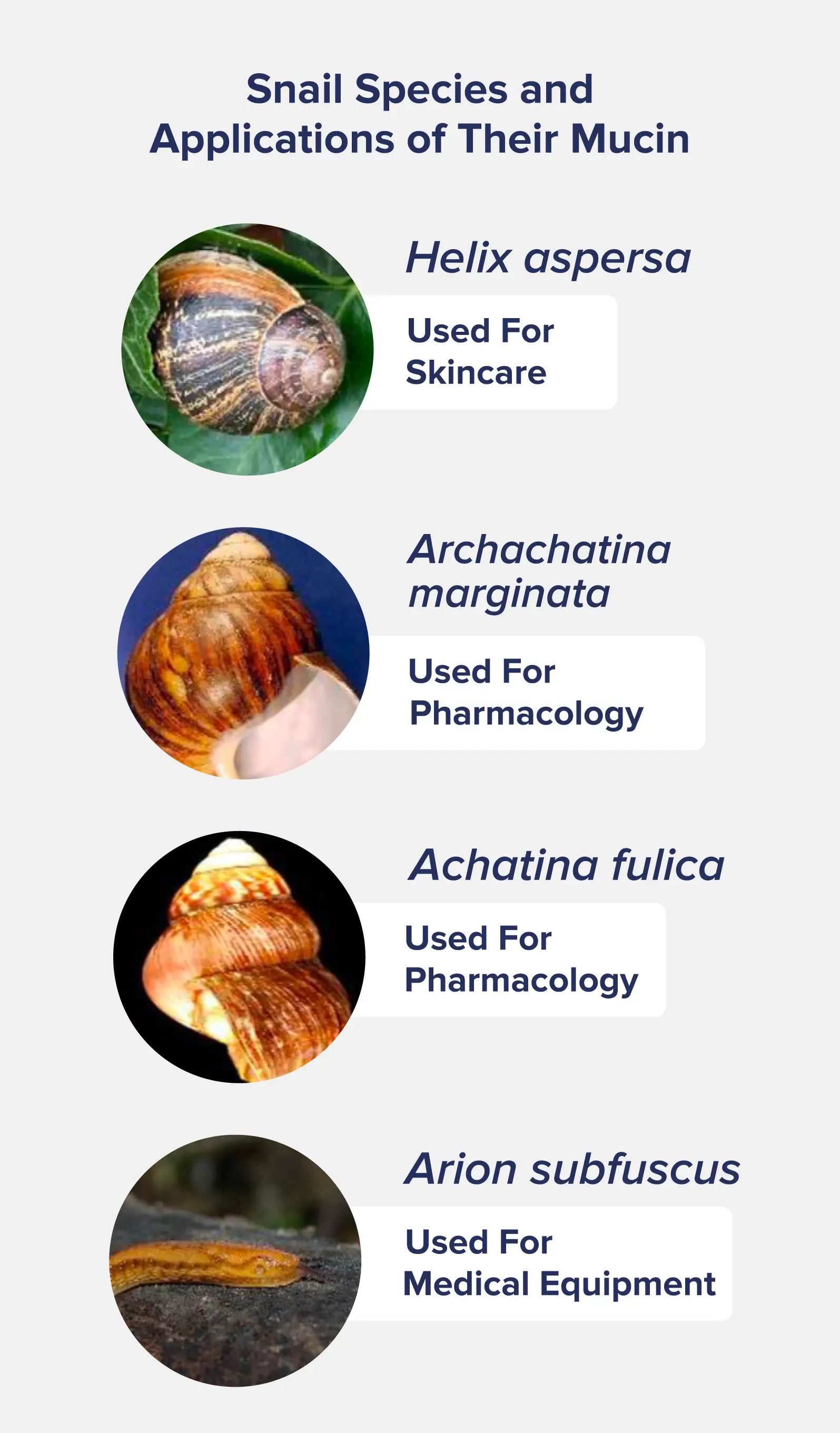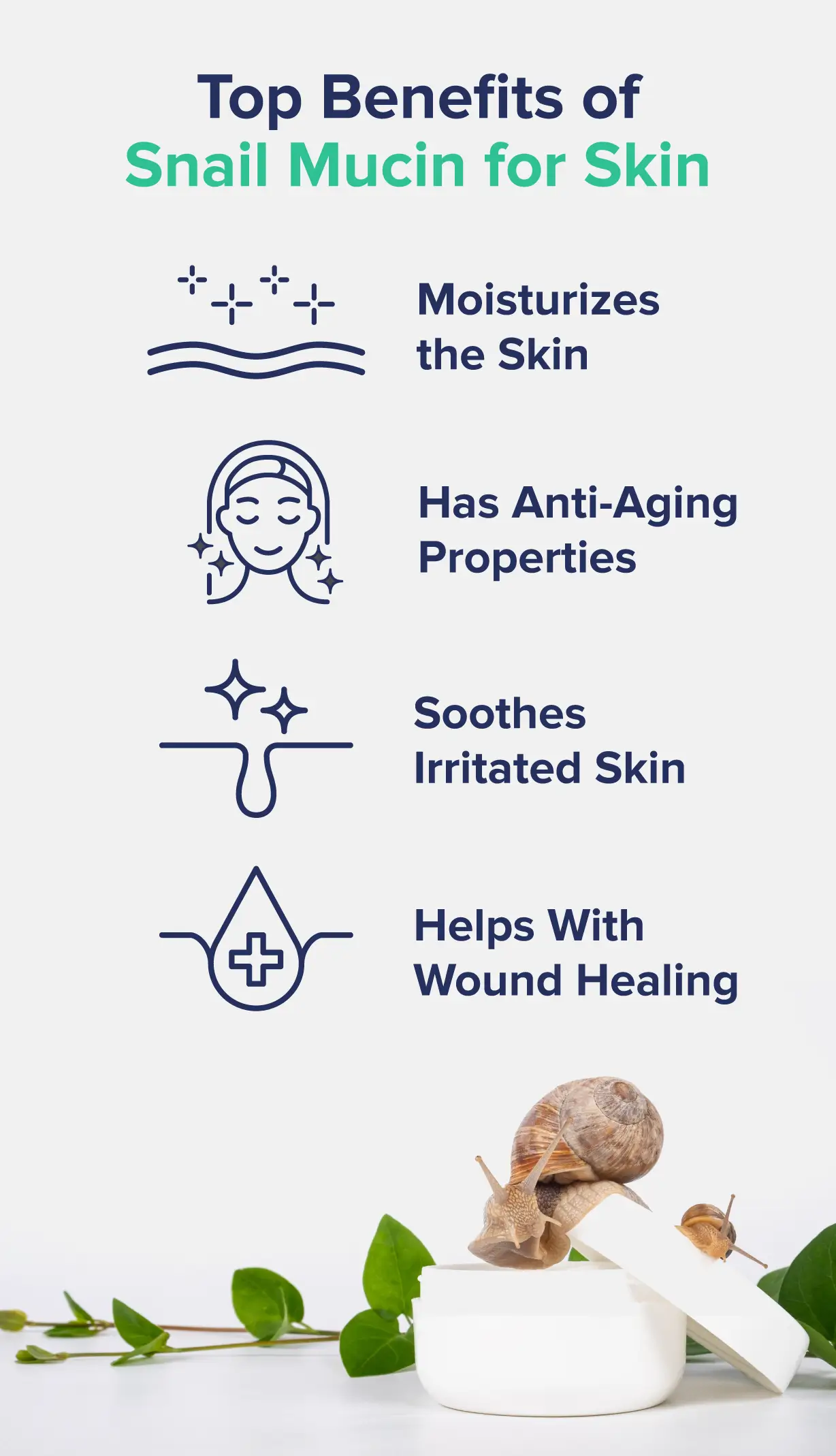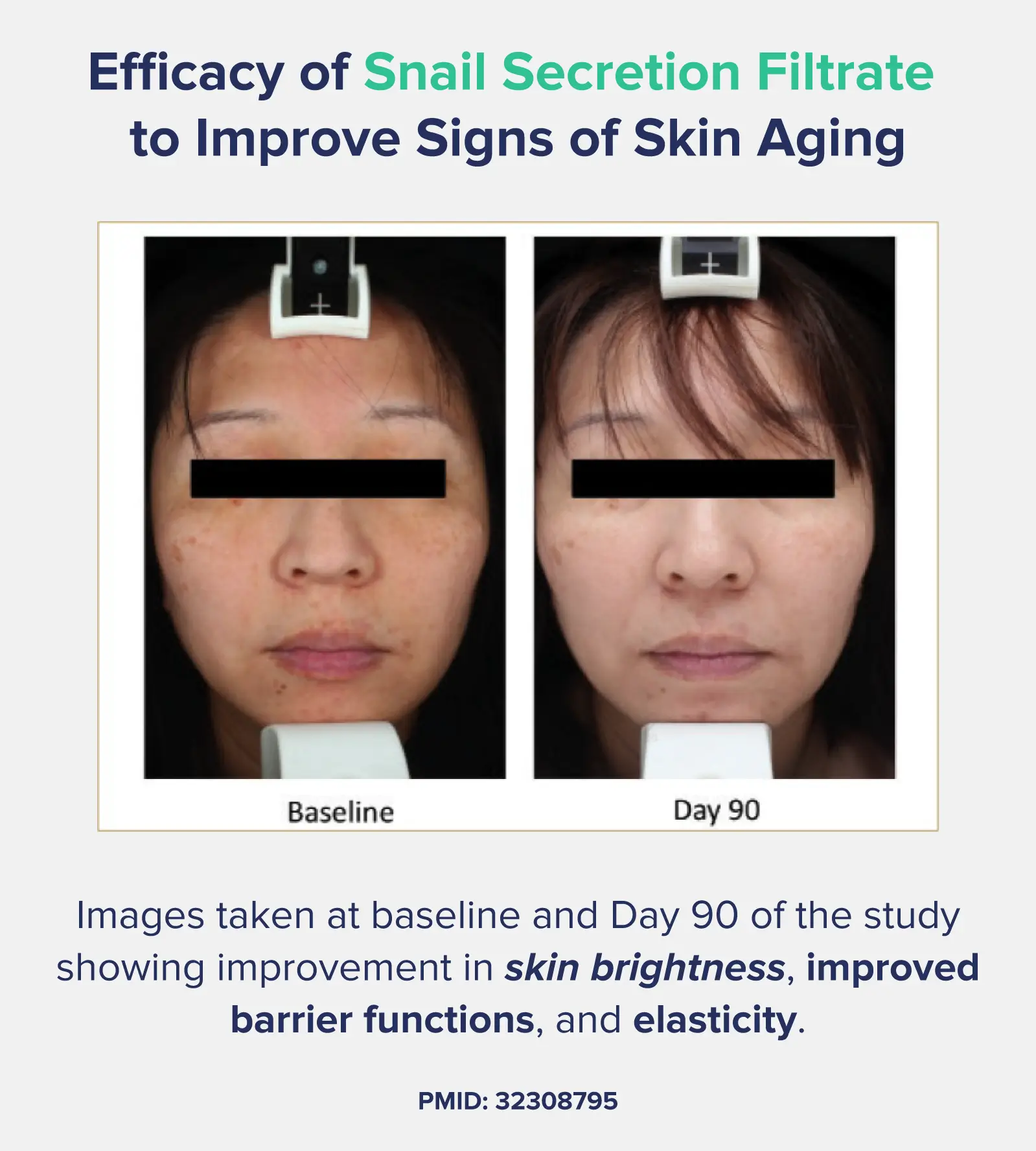Talk to a Registered Dietitian and use INSIDER20 for 20% off!
Talk to a real Dietitian for only $99: Schedule Now
This post contains links through which we may earn a small commission should you make a purchase from a brand. This in no way affects our ability to objectively critique the products and brands we review.
Evidence Based Research To fulfill our commitment to bringing our audience accurate and insightful content, our expert writers and medical reviewers rely on carefully curated research.
Read Our Editorial Policy
Snail mucin is one of the biggest skincare trends at the moment, originating in Korean beauty over a decade ago and recently making its way over to the States.
This is not one of those names that sound like something worse than it is; snail mucin is exactly what it sounds like—literally, the mucus or slime trail left behind when a snail scoots along its way.
If you can get past the ick factor, snail slime might just be your newest skincare addiction for helping with dryness, acne, anti-aging, and more—let’s take a deeper dive into these purported benefits and learn how to use snail mucin in your skincare routine.
Snail mucin is the excretion from a snail—that little trail it leaves behind when it’s on the move.
You might also see snail mucin listed on skincare products as snail secretion filtrate (SSF), snail essence, snail mucus, or snail moisturizer.
In case you’re wondering how the magical skin-loving properties of snail mucin were discovered (we sure were), the alleged story is that escargot farmers in Chile ended up with incredibly smooth hands after dealing with the snails—and, voila, another skincare trend was born.
Although the popularity of snail-related skincare products is relatively new, interest in the slime-trailing invertebrates dates back to ancient Greece, where snail and slug mucus was used to reduce inflammation and fight signs of aging.

Each species of snail (there are thousands, by the way) can secrete mucus for different functions, including microbial defense, hydration, egg protection, and allowing them to adhere to surfaces and walk upside down.
For skin care purposes, only mucin from edible snails is used, typically the Roman snail (the escargot of the world) and the garden (baby gray) snail.
Now, humans have tapped into the potential of snail slime, using it for skin care, wound healing, drug delivery, and biomedical research.
As snail mucin has not been around for too long (as a skincare ingredient, that is), we don’t have extensive published research on it.
While research on these topics is growing rapidly, ethically extracting the mucin in a non-invasive way is a slow process (it moves at a snail’s pace, if you will), so we still have much to learn in this area.

One of snail mucin’s top claims to fame is its ability to lock in moisture, as it contains natural glycoproteins, enzymes, and humectants to prevent the snails from experiencing moisture loss.
These compounds can repair the skin barrier, sealing in moisture while keeping out environmental irritants.
Snail mucin is also a natural source of the polysaccharide hyaluronic acid—a much-loved skincare ingredient that holds onto water and hydrates and plumps the skin.
As all skin types need moisture, snail mucin is good for just about everyone, including those with dry skin, acne-prone or oily skin, sensitive skin, and mature skin.
In addition to the hydrating and plumping hyaluronic acid, which can make more mature skin look hydrated and youthful, snail mucin also contains growth factors that stimulate collagen production.
We know that collagen is essential for healthy skin, and many people take it in supplemental form—but research also shows that topically applying these growth factors in the form of snail mucin can increase collagen synthesis.
Plus, the growth factors in snail mucin have been found to increase the growth and activity of fibroblasts and keratinocytes, accelerate the processes of skin regeneration, and prevent or reverse aspects of skin aging.

Snail mucin also contains glycolic acid (another collagen booster), the antioxidants vitamins A and E, and copper peptides, which may provide a wrinkle-reducing effect that improves skin vitality and elasticity.
One small study backs up these claims. Published in 2013, this 14-week study had 25 people with severe facial photoaging (sun damage) put a topical serum containing snail secretions on one side of their face, with a placebo product on the other side.
They found that the snail mucin side of the face fared much better after 12 weeks, showing improvements to periocular rhytides and fine facial rhytides (fancy terms for crow’s feet and fine lines) and improved skin texture, which continued for two weeks after stopping use.
Another more recent study also found beneficial results. Fifty women aged 45 to 65 with photoaged skin were randomized to use a product containing snail secretion filtrate and snail egg extract or a placebo.
After two months, the snail secretions group had significant reductions in transepidermal water loss (a cause of dehydrated skin and the appearance of fine lines).
They also had improvements in skin roughness, firmness, elasticity, fine lines, and wrinkles (although the latter two were not significantly different from the placebo group).
Another key component of snail mucin is allantoin, an anti-inflammatory compound thought to calm irritation, promote skin repair, and stimulate cell regeneration.
Allantoin is a commonly used ingredient in over-the-counter skin creams designed to relieve itchiness and irritation or protect the skin after minor cuts and burns.
This compound—along with many of the previously mentioned ones—may help with soothing dehydrated skin, relieve redness and irritation, and moisturize itchy and sensitive skin.
Due to its collagen-boosting and regenerating properties, snail mucin is beneficial for wound healing.
Research shows that garden snail mucus increases wound healing rates by regulating antioxidant and free radical balances, and it has also been found to facilitate skin regeneration after acute radiodermatitis (skin injuries after radiotherapy treatment).
Plus, snail mucin has antimicrobial properties that can help to protect broken skin or injuries from certain bacteria, facilitating wound recovery.
Lastly, snail mucin may offer therapeutic potential against melanoma, one of the most dangerous skin cancers.
In a cell-based study in the lab, snail mucus secretions were found to decrease the viability of and inhibit the metastasis of melanoma cells, meaning it inhibited the cancer cells from being able to survive and grow.
While we don’t have any research on humans on this topic, the beneficial compounds found in snail mucin are of significant interest to the skin cancer research field.
There are several ways to incorporate snail mucin products into your skincare routine, with the most common being serums, essences, and creams.
Serums typically come in smaller containers and are more concentrated, meaning you only need to use a little at a time for significant results.
If you are using snail mucin for anti-aging purposes, a serum would likely be your best bet.
A snail mucin essence will be a thinner, water-based product, which can be helpful if you want a less concentrated version.
Snail mucin moisturizers or creams are thicker and can be used as the last step in your skincare routine (unless you use facial oils, which would go on last).
Lastly, you might find snail mucin in face masks or cleansers.
Some of the best snail mucin brands and products include:
Snail mucin is generally a well-tolerated skin care product, and no significant side effects have been noted.
However, everyone’s skin is different, so if you have sensitive skin, do a patch test first (apply a small amount to a tiny patch of skin to ensure you don’t react negatively).
As snail mucin is a natural source of hyaluronic acid and has many other skin-supporting compounds—like enzymes, vitamins, and growth factors that stimulate collagen production and regenerate skin cells—snail mucin could be considered a better skincare ingredient than hyaluronic acid.
As snail mucin is an animal-derived product (straight from the snail itself), it would not be considered a vegan product in the strictest sense of the word. It could be considered similar to honey, so if you’re more lax with your vegan diet and consume honey, you might consider using snail mucin, but that’s up to you and your values. A totally vegan-friendly alternative is hyaluronic acid, which has similar moisture-locking properties as snail mucin.
Snail mucin is beneficial for:
• Moisturizing skin
• Regenerating skin cells
• Fighting bacterial growth
• Wound healing
• Reducing wrinkles and fine lines
• Fighting photodamage (sun damage)
• Hydrating and plumping skin
• Improving skin vitality
Snail mucin comes straight from a snail—it is the secretion or mucus left behind when a snail crawls along.
To get snail mucin, ethical skincare companies typically allow snails to scoot naturally in a dark and calm room along a mesh surface or net that collects the mucin. Each snail only produces about one fluid ounce of mucin naturally per day.
In a humane practice, no external stress will be applied to the snails to force them to produce or excrete mucin. The healthiest mucin comes from healthy and comfortable snails; however, they may make more mucus when stressed.
Unfortunately, this means that some producers might try to induce stressful situations to extract more mucin.
Conversely, many other snail mucin brands harvest the mucus in a humane, ethical, and healthy manner, not forcing them to produce more mucus under stressful conditions but simply allowing them to roam about and collecting what comes out.
Three ethical brands and products include COSRX (The COSRX Advanced Snail 96 Mucin Power Essence), SeoulCeuticals (Multi-Function All-in-One Anti-Aging Snail Repair Cream), and Mizon (Mizon Snail Repair Intensive Ampoule).
Collecting snail mucin should not hurt snails. As they are doing their natural process of scooting along, they are not forced to extract mucin or harmed to collect more than they naturally excrete. However, not all producers of snail mucin are ethical and humane.
If you are buying a snail mucin moisturizer or skincare product, be sure that the brand explicitly states how they collect the mucin, as you want to ensure it is cruelty-free. As snail mucin products become more popular, it’s likely that non-ethical brands will come about and try to profit from the trend and collect mucin in a faster way.
Yes, snail mucin serums or moisturizers can be beneficial for acne-prone skin. Snail mucin is non-comedogenic (does not clog pores) and has anti-inflammatory properties that may benefit people with acne. It also has antimicrobial properties, which can be beneficial for killing off certain acne-causing bacteria.
However, read ingredient labels because, while snail mucin itself is non-comedogenic, many skin care products will add other ingredients that can clog pores (like coconut oil, shea butter, seaweed, and many more).